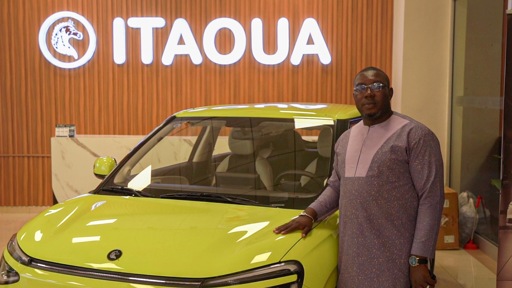Under the government of President Ibrahim Traoré, Burkina Faso launched its first brand of domestically assembled electric cars, Itaoua. The name is a tribute to a village near Ouagadougou, the country’s capital. The horse that illustrates the logo represents strength, prestige, and longevity.
To learn about the models already available and understand how Itaoua has become a symbol of the industrial and sustainable transformation the country is experiencing, Brasil de Fato visited the company’s headquarters in Ouagadougou. The concessionaire’s general director, Abdoulatif Rouamba, recalls the beginning of this journey.
“Production began in January 2025. Then we started selling Itaoua electric vehicles. We began with two entry-level models, the Itaoua Sahel and the Itaoua Native. Later we received other models, such as the Itaoua Tenakuru and the Itaoua Land Elder, which is a pickup truck,” Rouamba explains.
“Today it’s possible to drive comfortably, at a low cost, and still protect the environment for future generations. Driving an Itawa electric vehicle is a direct contribution to this preservation,” he adds.
Economical and modern
With technical support from China, the electric vehicles are assembled in Ouaga 2000, a district located 25 km from the capital. According to Rouamba, Burkinabé engineers were trained in Chinese factories and are now applying this knowledge on African soil. He states that at the moment, the brand only handles the assembly process, but that there is a “prospect of launching our own designs in the coming years”.
The director also values the partnership with the BRICS member countries. “We are working in a business environment with countries like China and Russia, within a win-win partnership logic. It’s not a collaboration model where we are exploited. Everyone gets their share. We are also involved in a technology transfer process. That’s why our technicians were trained abroad and today apply what they learned for the benefit of Itaoua, Burkina Faso, and Africa in general,” he says.
Despite the debate surrounding the use of minerals like lithium and cobalt, electric cars have a lower environmental impact due to the absence of direct CO2 emissions and other pollutants.
Itaoua’s most popular model is the Sahel, a compact, fully electric car equipped with GPS, Bluetooth, and a solar charging system. A full charge costs between 3,000 and 6,000 CFA francs, equivalent to between 30 and 60 reais. For comparison, a liter of gasoline currently costs around 8 reais in the country.
Salesman Cheik Omar Kone highlights the model’s efficiency: “The Itaoua Sahel has a range of up to 330 kilometers and can be recharged in just 30 minutes at home or at fast charging stations.”
The worker believes that the great advantage of electric vehicles is the low cost per kilometer driven. “The cars are economical, ecological, and fundamental for a country that faces difficulties in fuel management. With electric vehicles, we will help the population to move around more easily and sustainably,” emphasizes Omar Kone.
Ride-hailing service
Itaoua is also investing in hybrid models, such as the Tenakuru, equipped with 3D cameras, a panoramic sunroof, and three driving modes: economic, normal, and sport. According to representatives of the automaker, this new automotive industry is part of a strategy by the Ibrahim Traoré government to achieve energy sovereignty while providing employment for the country’s youth.
Read More: Sankara’s revolution rises again
For Omar Kone, this is a time of progress: “The country is evolving in several aspects: transportation, infrastructure, and much more. Many Burkinabés believe in electrification. We have already sold cars to the state, to private individuals, and even to a company that operates electric taxis. We are on the right track. The Burkinabé people truly trust electric vehicles,” assesses the young man.
Currently, around 30 electric taxis of the brand created by the Burkinabé government circulate in the capital Ouagadougou. The general director of Itaoua, Abdoulatif Rouamba, reveals plans to expand this fleet to more than 100 vehicles in the coming months.
“Currently, we have partners who purchase Itaoua electric vehicles and launch electric mobility models for app-based transportation, the VTCs. Instead of fuel-powered cars, there are already fully electric vehicles operating these services,” Rouamba emphasizes.
“It’s important to note that in Burkina Faso, most taxis are quite old, imported vehicles known as ‘France Au Revoir’. These cars arrive in the country already very worn out. Our goal is to create a new dynamic that allows taxi drivers to use brand new vehicles, which are much more profitable compared to those powered by fossil fuels,” he adds.
He concludes by projecting a future for this sustainable transformation: “I believe that, in the coming years, we will be able to conquer first West Africa, then all of Africa and, why not, reach European, American and Asian countries.”
This article was first published by Brasil de Fato in Portuguese.
The post Burkina Faso begins producing solar-powered electric cars with help from China appeared first on Peoples Dispatch.
From Peoples Dispatch via this RSS feed


